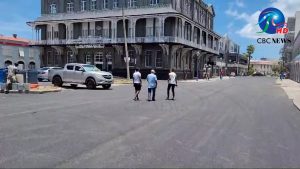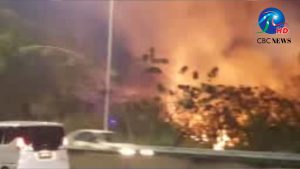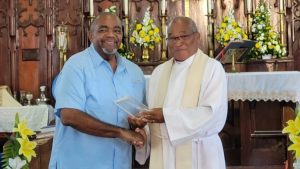GEORGETOWN, Guyana, CMC – The Caribbean Community (CARICOM) Wednesday said the referendum proposed by Venezuela in December has no validity as the border dispute between Guyana and Caracas reached a new level this week.
“The Caribbean Community (CARICOM) notes the decision of the Venezuelan National Assembly to conduct a popular referendum on defending Venezuela’s claim of the Essequibo,” the 15-member regional grouping said in a statement .
“CARICOM further notes that two of the questions approved to be posed in the Referendum, if answered in the affirmative, would authorise the government of the Bolivarian Republic of Venezuela to embark on the annexation of territory, which constitutes part of the Cooperative Republic of Guyana, and to create a state within Venezuela known as Guyana Essequibo.”
But CARICOM said that it wanted to reaffirm that “international law strictly prohibits the government of one State from unilaterally seizing, annexing or incorporating the territory of another state.
“An affirmative vote as aforesaid opens the door to the possible violation of this fundamental tenet of international law,” it added.
Venezuela had on Tuesday said it rejected the “offensive statements” made by the Guyana government regarding the upcoming consultative referendum on the Essequibo which the South American country continues to claim as part of its territory.
“The Government of the Bolivarian Republic of Venezuela categorically rejects the infamous and offensive statements of the Government of the Cooperative Republic of Guyana, regarding the consultative referendum scheduled for December 3, 2023, which are loaded with deep contempt for the people Venezuelan, its Bolivarian history and its right to express itself, in a democratic manner, in matters of special national importance,” Caracas said in a statement.
Earlier Georgetown said it is concerned that Venezuela’s referendum could lay the ground work for the annexation of the county of Essequibo, which Caracas has been claiming belongs to it.
Guyana said it had taken “careful note” of the issuance by the National Electoral Council of Venezuela of five questions to be asked in the national referendum.
It said among other questions, all of which are intended to further Venezuela’s “unlawful and unfounded claim to more than two-thirds of Guyana’s national territory, question five is the most pernicious.
On Tuesday, both President Irfaan Ali and the Opposition Leader Aubrey Norton condemned what they described as “the flagrant violation of the rule of law by Venezuela”.
A joint statement issued following talks between the two Guyanese leaders said they both agreed “that no effort should be spared to resist that country’s persistent endeavours to undermine Guyana’s sovereignty and territorial integrity”.
Guyana instituted proceedings against Venezuela by Application to the International Criminal Court (ICJ) on March 29, 2018 asking the Court to resolve the controversy that has arisen as a result of Venezuela’s contention, formally asserted for the first time in 1962, that the 1899 Arbitral Award Regarding the Boundary between the Colony of British Guiana and the United States of Venezuela is “null and void”.
Georgetown said it remains firmly of the view that the Arbitral Award of 1899 is valid and is committed to a path of final and peaceful settlement and will continue to adhere to the rule of International Law and the procedures of the ICJ.
In its statement, CARICOM said it is to be emphasised that the land and water in question, namely the Essequibo Region of Guyana, comprises more than two-thirds of the whole of Guyana itself.
“CARICOM notes that the language of two questions approved to be posed in the Referendum seeks an affirmation and implementation of Venezuela’s stance on the issue “by all means, according to/with the Law.” It is open to reasonable persons to conclude that “by all means”, includes means of force or war.
“CARICOM earnestly hopes that Venezuela is not raising the prospect of using force or military means to get its own way in this controversy over territory. After all, it has been the long-standing position of Latin American and Caribbean counties, including Venezuela, that our region must remain a zone of peace.:
Meanwhile, CARICOM is insisting that the referendum proposed by Venezuela “has no validity, bearing, or standing in international law in relation to this controversy.
“The referendum is a purely domestic construct, but its summary effect is likely to undermine peace, tranquility, security, and more, in our region.
“CARICOM reiterates its support for the judicial process and expresses the hope that Venezuela will engage fully in that process before the International Court of Justice which has determined that it has the jurisdiction in the case brought before it to determine the validity of the 1899 Arbitral Award which Venezuela questions.
“The Court’s final decision will ensure a resolution that is peaceful, equitable and in accordance with international law,” the regional grouping said in its statement.






More Stories
Smooth driving on Broad Street soon
Anglican Church resuming ‘common cup’ communion
Windies Women defeat Pakistan Women